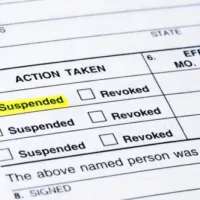Driving on a Suspended License

Driving while license suspended can be a civil traffic infraction or it can be a criminal offense. The key difference between the two charges is knowledge. Driving while license suspended unknowingly is a civil traffic offense, the criminal charge requires knowledge that their licenses were suspended. The State can attempt to prove knowledge by your own admission to the officer that pulled you over (i.e. I knew my license was suspended I was about to go get that taken care of officer), or by showing that the department of highway safety and motor vehicles notified you about the pending suspension via mail.
Your Record Matters
Driving while license suspended is another one of those criminal offenses that can be enhanced based on priors. Meaning the severity of the offense or maximum penalties you face becomes great if you have a prior offense for the same charge. A driving while license suspended charge or DWLS charge starts out as a second-degree misdemeanor offense meaning that the maximum penalties you would face are 60 days in jail or up a $500 fine, you could also be placed on 6 months of probation.
If you have a prior DWLS charge in your history and are again arrested for DWLS it could be charged as a first-degree misdemeanor. A misdemeanor in the first degree carries a maximum punishment of up to 1 year in the county jail and up to a $1,000 fine, or you could be placed on up to 12 months of probation. When considering prior offense for DWLS all priors are counted regardless of whether you were adjudicated guilty or if adjudication of guilt was withheld.
Felonies Can Result
If arrested for a third offense for DWLS, you may be facing a felony charge. A third offense DWLS can be enhanced to a felony of the third degree, meaning the maximum penalty would be up to 5 years in prison or up to a $5,000 fine, a person could also be placed on probation to a period of time not to exceed 5 years. However, not all third offense DWLS qualify to prosecuted at the felony level, if charged with a third offense DWLS you may be able to get it reduced back to a first-degree misdemeanor.
Depending on what the basis of suspension is (i.e. child support), if the individual’s criminal history (if any) includes a forcible felony, or if they even have enough prior DWLS charges, the DWLS may not qualify as a felony. In some instances, civil DWLS citation is sometimes mistakenly counted as a prior, which leads to a person getting arrested for an enhanced DWLS when it is not the correct charge.
Another way a person could be charged with a felony for DWLS is if they are considered a Habitual Traffic Offender or HTO. A habitual traffic offender is a person who has received either 3 DWLS offense in a period of 5 years, a person can also be HTO for having a combination of 3 convictions (withholds count too) for either DWLS or DUI in a period of 5 years or 3 DUI conviction in five years. Being labeled as HTO will lead to your license being suspended by the Department of highway safety and motor vehicles for a period of 5 years. Also, being labeled an HTO could result in being prosecuted for a felony DWLS.
Call Meldon Law if You Are Charged With Driving on a Suspended License
That is why hiring an experienced attorney is important for a DWLS offense, at Meldon Law we have the knowledge and experience to review your driver’s license history and criminal history to ensure you’re not charged with the wrong offense and possibly attempt to get the charge reduced or dismissed. We also have the knowledge to help you get on the right path to getting your license valid again, a license can be suspended for numerous reason, we can help walk you through what you can do to get your license back or potentially a hardship license. Call us at 800-373-8000.



